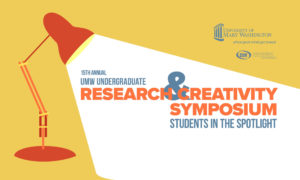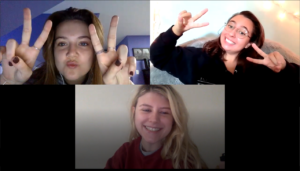Ashley Utz knows that over-the-counter medications like Prilosec and Prevacid are typically used to treat ulcers, reflux and other common stomach disorders. But the senior biochemistry major has a theory that these drugs, known as proton-pump inhibitors (PPI), could also help destroy cancer cells.

Tomorrow, along with more than 100 of her University of Mary Washington peers, Utz will share this trailblazing research, which she’s toiled away on in Jepson Science Center labs for the past year, in the midst of a global pandemic. The 15th annual UMW Research and Creativity Symposium, held virtually again this year due to COVID-19, will put a spotlight on one of Mary Washington’s top priorities: undergraduate research. Featuring PDF posters and oral synopses on video, Thursday’s presentations will span disciplines from science to sociology, math to music and classics to communication and will remain accessible through Friday for questions and comments.
“When students discover how to pursue and investigate their own research questions, interpret the information they uncover and communicate their findings, it brings their learning to life and puts the knowledge and skills they’ve gained into practice,” said College of Arts and Sciences Assistant Dean Betsy Lewis, who described her own undergraduate research experiences as “life-changing.”
Last year was an “experiment,” said Lewis, who was in charge of moving the event online when Mary Washington suddenly switched to remote learning last spring. But she hailed the day as a success. “The entire UMW community pulled together to support students.”
Other schools showcase student research, she noted, but UMW’s event is one of the longest running and widest reaching. “Few universities cover so many disciplines in one symposium.”
More than 70 projects – submitted by nearly 150 students – explore topics from music therapy to Middle Eastern immigration, from censorship to coffee bean growth, from accessibility in libraries to antifungal resistance, from resident curator programs to rural health care access. The projects were completed individually or in teams for coursework, senior capstones and departmental honors, while working in close consultation with, and often alongside, faculty with appropriate masking and social distancing.

COVID-19 inspired seniors Jenna Holland, Rachel Walters and Isabella Burns, who explored the impact of the pandemic on teachers in Nepal for their public sociology course. Under the mentorship of Associate Professor of Sociology Leslie Martin, the trio teamed up with three students enrolled at UMW’s partner institution in the south Asian country, who helped them survey 107 educators in Kathmandu.
The teachers’ pandemic problems weren’t so different from their American counterparts, Burns said. “Internet access was a common issue, and there was a clear dissatisfaction with remote technological devices.” She recently joined Holland and Walters in penning a reflective essay of their cross-cultural learning experiences, which was published in the Undergraduate Journal of Service Learning & Community-Based Research.
Students like Utz have benefited from the types of high-impact learning opportunities offered at UMW. For the past four years, she’s assisted Associate Professor of Chemistry Randall Reif with his research. Now, the tables have turned.
“This project was so special because I was able to craft it entirely myself, with my professor’s guidance,” said Utz, who hopes her findings will contribute to existing knowledge about the drugs doctors have at their disposal to treat cancer. PPIs are currently used with chemotherapy, she said, but little research exists on their effectiveness as stand-alone anti-cancer agents. “We hope our work will be one of many research efforts to answer that question.”
Graduating next month, she’ll soon move on to North Carolina State University to pursue a Ph.D. in molecular and structural biochemistry, and eventually, a career in cancer research. But Utz is confident that her project will be in good hands, as she’s training UMW sophomore Shreya Murali to take it over this summer.
“While I may not continue with this particular research,” Utz said, “it will live on at UMW.”
More than 50 privately funded endowments support student research, internships and study abroad experiences at UMW. Thursday night, April 29, donors to these and other scholarships and programs, were invited to a virtual student panel presentation where select students presented their research and fielded questions from those in attendance. For more information about student research at UMW, please contact College of Arts and Science Assistant Dean Betsy Lewis, at elewis@umw.edu.

